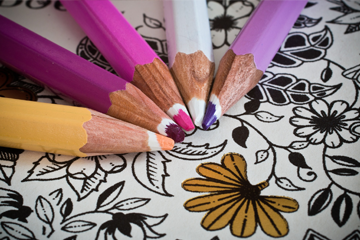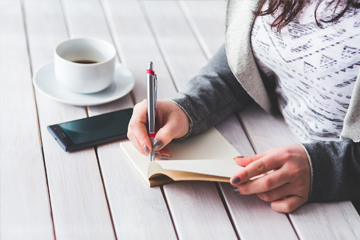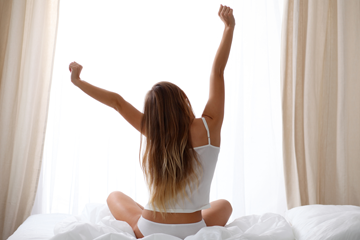
Speedy Stress Hacks to Make Your Day Silky Smooth
It’s 8 AM, and you’re a tired bundle of nerves: You couldn’t sleep, your car’s almost out of gas, your big project at work is due this week, and on top of it all is that another gray hair? Life can get overwhelming.
There are all sorts of things you can do to relieve stress, like getting a good night’s sleep in a comfortable bed in your go-to cozy silk sleepwear, eating more healthily or exercising more often, but the problem is that not all of them are particularly realistic for everyone. Not everybody has the time to run marathons, and sometimes you simply can’t sleep due to your phone (or your child) exploding every few hours. But don’t worry, you’re not doomed to a life of eternally frazzled stress. We’ve put together a list of our favorite proven stress-reducing hacks just for you!

Coloring: It might sound crazy, but grabbing a crayon and using it to color can be as relaxing for adults as it is for kids. Adult coloring was a short-lived craze back in the early 2000s. It was originally grounded in art therapy for dealing with the negative mental health impact of serious diseases, so it’s quite a robust stress relief method. Taking a crayon or pencil to paper helps calm your amygdala, which controls your more negative emotional responses, such as fear and anger. It can help you build concentration, relieve stress, and even has many of the same mental health benefits that meditation has. Even better, it’s something you can do to simultaneously relax with your kids and keep them quiet, further enhancing that stress relief.

Walking: While it’s easy to live a life entirely free of walking thanks to grocery delivery services and online shopping, walking is actually an excellent de-stressor. It’s one of the easiest ways to calm your mind and, if you do it, you can honestly tell everybody that you exercise regularly. You can walk almost anywhere and at almost any time throughout your day. It’s best to channel your inner spirit animal and walk around in nature as opposed to alongside a highway, but really, any kind of walking has numerous health benefits, including mood elevation, production of endorphins, bone strengthening, and improving heart health.

Reading: Now, you may not have time to curl up and read an entire book, but guess what? You don’t actually need to read the whole thing. As little as 5 minutes of reading a book on your phone whenever you feel a little too stressed is easy and can be done at any time: during a lull at work, when your kids are (temporarily) pacified, or even while waiting in line. Even short bursts of reading can significantly reduce your stress level, and it even helps prevent alzheimer’s.

Writing: Whether it’s on paper, in a notebook, or even a short paragraph on your laptop or phone, writing a short journal or note about your feelings is an excellent and simple way to de-stress. It provides an outlet for your feelings while also allowing you to assess them objectively, and it can also be great for self-development. What you write does need to be a little bit longer than your average facebook post though, so do keep that in mind.

Deep Breathing & Focus: Deep breathing exercises have become more and more popular for a good reason: they work. When you get stressed out, your breathing changes. We make shorter, shallower breaths and only use the top of our lungs, and this causes a physiological response that encourages stress. There are tons of variations, but they all share the same premise: making you take a few slow, controlled breaths from your abdomen. The most famous deep breathing method is probably the 4 7 8 technique: breathe in slowly, making sure to breathe from your stomach, for 4 seconds, hold that breath for 7 seconds, and slowly breathe out for 8 seconds. Repeating this 3-7 times will help calm you down and reduce your stress level.

Body Scan: A relaxation body scan is a simple type of mindfulness meditation, and although the body scan is technically a form of meditation, it’s a bit like dipping your toes in the ocean of meditation. It’s simple and doesn’t require a significant mental or time commitment., and can be done in 3, 5, 10, or even 30-minute increments, depending on how much time you have. A body scan is simple, in concept: you mentally check every part of your body, see if it’s tense, and if it is, you relax it. We would recommend using one of the many free tapes available online the first couple of times, as they can help you ensure you’ve targeted all the parts of your body most affected by stress.

Meditation: This is the big one, the holy grail of stress relief. It increases cognition, has health benefits, and, of course, reduces stress. Don’t shy away from the concept due to preconceived notions about meditation: there are countless traditions and styles of meditation to choose from, either with or without a spiritual component. You can practice a bare bones, grounded style or go for full blown chakra mastery with a side order of universal oneness: they both have the same benefits for stress. Full on meditation definitely requires the most effort out of all of the stress reduction techniques here to learn, but it’s certainly the most effective method of stress reduction short of medication – in fact, academic studies have shown it’s about as effective as medicating yourself for reducing stress.





Leave a comment
This site is protected by hCaptcha and the hCaptcha Privacy Policy and Terms of Service apply.